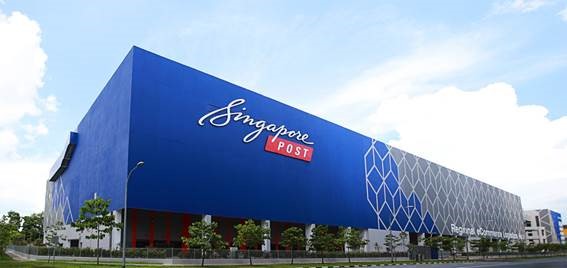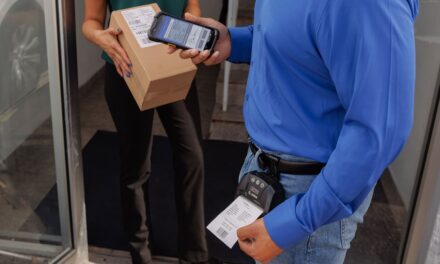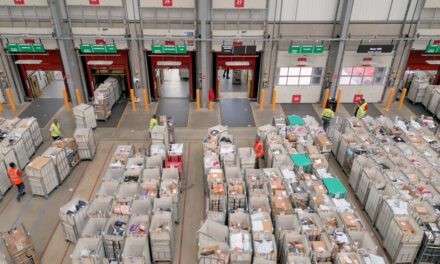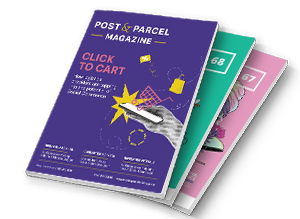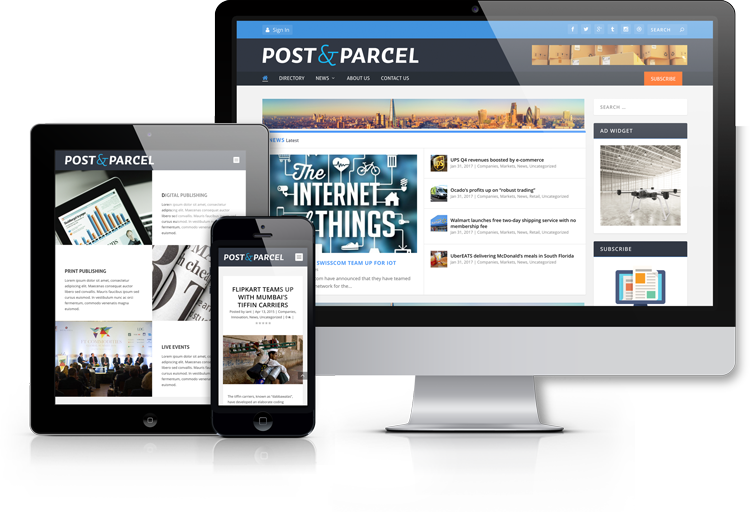
Shaping the future of logistics
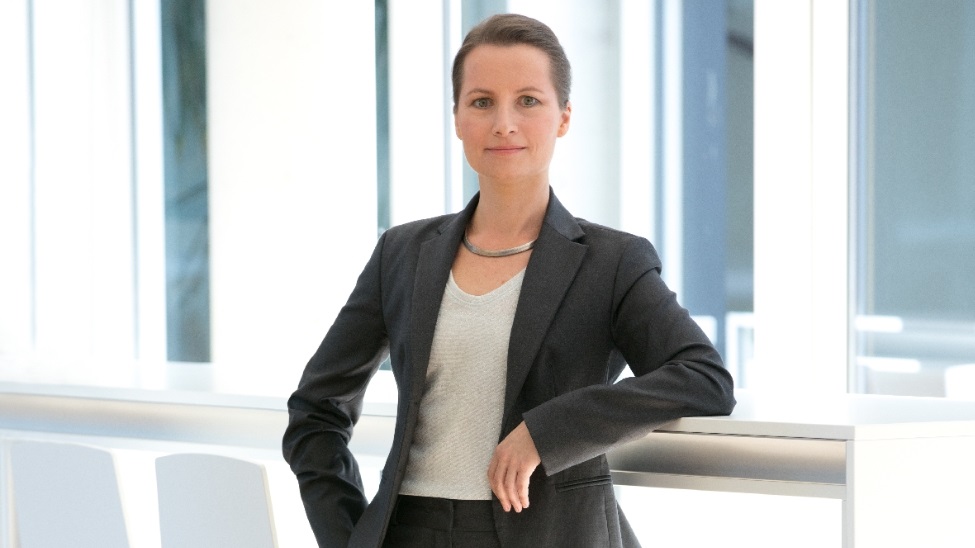
INFORM’s Senior Vice-President Dr Eva Savelsberg, spoke to Post & Parcel about the diversity of optimisation, how the sector can leverage AI and the importance of thinking ahead
Can you describe your role at INFORM?
I joined the company 13 years ago. At that time, INFORM had around 250 employees; so still a medium-sized software company. Today, we have over 800 employees and I’m heading the Logistics business unit. Logistics is actually quite a broad area – as it is one of INFORM’s older business units.
Today the Logistics business unit provides AI and optimisation software to maritime ports, inland – or intermodal – terminals, distribution centres, and of course post and parcel operators.
But as well, we also optimise the logistics of building material producers, like cement, and we offer optimisation for retailers. So it is quite broad, but at the core of the business, is always logistics, it’s always how can we work more efficiently, how can we support the processes of our customers by implementing artificial intelligence and operations research (OR) methodologies to improve their bottom lines.
It’s interesting to hear that INFORM is broader than just the post and parcel sector.
Oh it definitely is. We are really strong in areas starting from aviation, supporting the whole ground handling at airports and going all the way to, for example, the banking and insurance industries, where we help to detect fraud in their transactions.
We try to walk around with our eyes open to new opportunities and so over the 50 years the company has existed for, we’ve met potential customers in very diverse business areas and contexts. When you consider that optimisation is so broad, that you can use AI and OR algorithms in such diverse industries and deliver a really big impact. It is easy to see how INFORM has grown over the decades to encompass so many application areas of our core optimisation competency.
How did you get into the field of logistics and what attracted you to INFORM?
My background is mechanical engineering. That’s also where I did my PhD thesis. But at that time, I was already working quite closely with industry and always in the, let’s say triangle of mechanical engineering, software, and logistics. So I’ve been involved in this field for a couple of decades.
I thought that was pretty lucky because on the one hand it’s such a broad field, but on the other hand it also has such a vast impact on our economy and on our personal life. So for me, it was always very fascinating to be part of shaping the future of logistics and software for logistics. That’s also how I met INFORM and how I came to work with the company.
Does it help having a foot in both academia and industry? I understand that you still lecture at the university.
Indeed, I still lecture at the university and I enjoy that quite a bit. But my day-to-day work is predominately in industry – my work for INFORM. Once a year, I have the pleasure to run a course at the RWTH University here in Aachen.
I think the nice thing about it is that you always need to reflect your work in the context of the world. I try to keep it interesting for the students and for myself. I try to think about it over the course of the year and to question, “Okay, wow, that’s interesting. What are interesting technical developments or interesting political development and how might these be interesting to pick up and integrate into course.”
The course I run – Innovation in Freight Transportation – is quite broad. But, since I have a bit of freedom, I can always shape it a bit. So this year I introduced the UN Sustainable Development Goals, or SDGs for short to also use those as a framework to reflect in. Students, and myself need to continually question, “okay, what products do we think will have an impact to the future and how are those topics interrelated?” So I guess it helps me to see things from different angles and this helps me for sure in my day-to-day work at INFORM.
Why do you think people are fascinated with artificial intelligence?
I think it is a fascinating topic for people, perhaps due to the myths around artificial intelligence, because I think people just assume upfront that it’s really nerdy stuff and that it’s really difficult to understand. But actually, if you invest a little time, you can at least get a quite good grip of how it works in principle, of how you can utilise it and of what might be the impact.
I think people are also fascinated because it will have a decisive impact on their life. Actually it already has, I mean we have smartphones and those are packed with artificial intelligence and we rarely consider it. But to think about what’s ahead of us, “AI is a resource”. That aside, the questions: How can we use it? How can it be a tool for us? AI is very usable and you can implement it in many and diverse applications.
Data and AI are a bit like a screws and the screwdriver, respectively. Screws existed from the early first century, but it wasn’t until the invention of the first screwdrivers in the 1700’s and subsequent standardisation in the 1900’s that they came into mainstream use.
Data has existed since the advent of the computer and the quantity of data has exploded exponentially since the internet enabled easy sharing of data. It’s estimated that 90% of all the data in the world was generated in the last two years alone. The human mind can, simply put, no longer comprehend all the data that’s available and that is where AI, as a tool comes in.
So, how exactly can AI be a tool for the post and parcel sector?
From my perspective during the last years, the post and parcel sector focused a lot on how to cope with declining post volumes and also how to use AI to gather more knowledge about their customers; which was good. So, they were able to respond more to customers’ needs. But I think now, perhaps, it’s a point in time to look at how can they use AI to make their processes more efficient and also how can they leverage AI.
At least in Germany, that’s really a pressing topic. In the coming years we will have fewer and fewer skilled workers, so in general, Germany needs to embrace more automation in the post and parcel sector to make up for the labour shortfalls that are expected. But, we still need to consider, that so far, robotics and AI still have their limitations and the human brain still has its advantages. But, AI can certainly support the humans through automation to relieve them from their daily tasks so that they can concentrate on being creative, on troubleshooting, on stuff which suddenly comes up and AI is not trained to handle
Is there much resistance from the post and parcel sector to employing AI?
For me it isn’t a question of resistance or no resistance to AI. It is a question of where post and parcel operators are focusing their attention, and subsequently their investments, in AI currently. As noted, there is a good deal of knowledge on the side of AI organising customer insights and knowledge. I think that operators are not so aware yet how much AI can bring to the table for the production itself, for the logistic processes.
We’ve just released our first whitepaper on the impact of an AI empowered yard management system on a parcel center’s sortation system – importantly, without changing a thing in the sorter. A system like our YMS that is complimented with AI and OR technology, can deliver strong performance increases and cost reductions beyond just the yard.
Do you think that people over- or underestimate AI in its current capacity?
Yeah. There is the saying and I think perhaps everybody heard it already, but still it’s quite right to say… people tend to overestimate what will happen in the short-term and underestimate what will happen in the long-term and I think that this definitely applies to AI. I’d say that in the next three years we won’t see much of the hype around AI change the parcel industry greatly. But, and this is an important but… over the next 20 or 30 years I’d venture a guess that AI will reshape logistics significantly. So, it might be a more steady change, but still, 20 years is actually quite a fast change process for an industry as old as ours. I’d say that in 30 years, our life will look quite differently.
If you could give post and parcel operators one bit of advice regarding AI, or even emerging technology in general, what would it be?
To think ahead with two perspectives. Firstly, the short- and medium-term perspective of how can we make use of the technology today and in the near future. Secondly, also to have a kind of think tank in their company, or even external support, about what might happen 10 to 20 years from now. To think about questions like: How can we prepare and steer the company for that future? How can we prepare the processes to support and work within our industry? And as well, how can we prepare as a society?
That’s an interesting perspective that I understand you embrace at INFORM too. We’ve had the opportunity to read a book you co-authored titled 2038: A Smart Port Story where you do just that.
We wrote 2038 to take this approach but also to open up our own minds and give ourselves the freedom to think ahead. I think the format of a story is an interesting approach because it not only helps people to use their imagination and think visually, but it makes it easier to think about what might come up as you aren’t limited by the preconceptions of the present day.
When people are thinking about the future, the second perspective to say, is it important to be right or is it about the exercise, about the thought process?
It’s definitely about the thought process. It is about thinking through different scenarios and also, I think, by just discussing these scenarios and getting these pictures of possible futures, they’ve already gained some flexibility in their brains and they get some competency in terms of adapting to an unknowable future.
I think it’s a bit like elite athletes. An athlete before a competition, they can withdraw in themselves and think about the competition and kind of play it through in their minds. Mental training is quite substantial in terms of performance and I think to have scenarios about the future is a mental training for a company or for the board of a company and that will help them even if the future doesn’t turn out as they planned for. But they will be flexible enough and will be capable enough to react.
What would you like to see INFORM achieve for the sector in 2020?
I would like to have the opportunity to sit down with different leading companies in the sector and to have a look at how we can achieve some of the benefits from the implementation of AI in the production processes. In fact, I think that would be helpful for the whole sector.
What would surprise people about your job?
I think the job is probably comparable to most jobs. A quite big stretch between thinking and strategy and thinking about the future, and on the other hand still taking care of details. And I think it’s a lot about human beings and the emotions of human beings. So that can be the emotions in a project team where you have to take care that everybody is in a position to work happily together. So although, let’s say, I have a quite technical background, actually daily business is influenced greatly by taking care of the people around me.
What are you currently working on and what do you find exciting about it?
If I step back to how we started the interview, talking about the broader field of logistics I think it will contextualise some of the insights I’ve shared today. We are working on some large scale, innovative logistics projects. It’s exciting to see how the outcomes from these projects will shape the future of the broader supply chain and this will no-doubt have flow-on effects into the post and parcel vertical.
Also, it’s exciting because at INFORM we’re focusing a lot on the UN SDGs discussed earlier and how these play out for us as a company down into how they impact our products and how our products impact them.
Outside of INFORM, in the European market, companies are also picking them up more than I’d originally thought. And so that opens doors for new developments to think about aspects also in terms of, “okay, which kind of footprint will that give?” And also if we have a new service provider, “how do we want to work together?”
This is also driving a shift that leads to a place where the answer to every business decision is not simply profit. And that perhaps changes a bit in the market and I think in the perspective, and that also opens up to say, “Okay, how do I want to work in a customer-vendor relationship and how do we want to produce as a company? Do we just want to look at profit or do we also want to look at what are the consequences of our actions – good and bad.”

